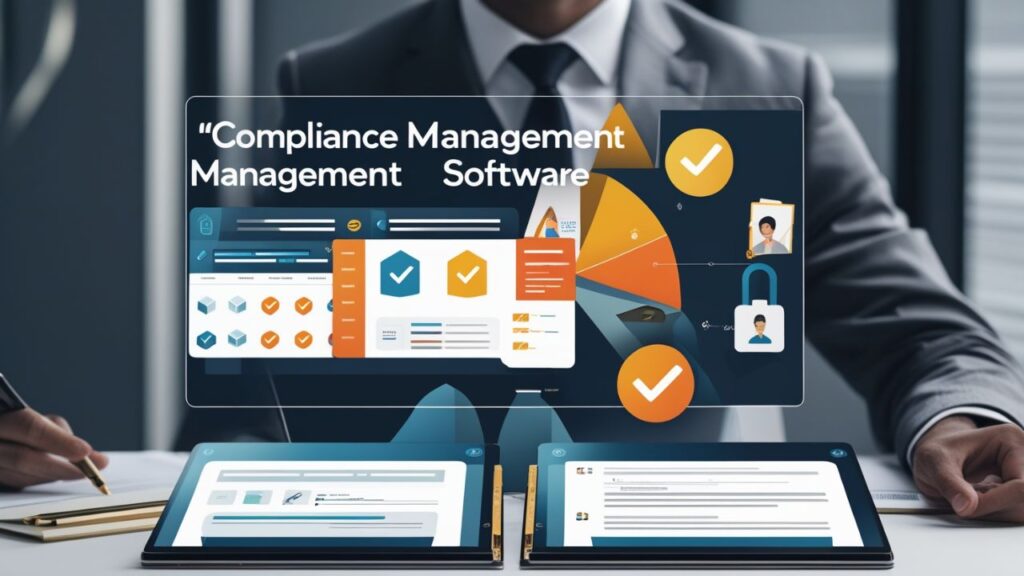Businesses rely heavily on compliance management software to follow rules better and protect their operational health while lowering their safety exposure. Businesses face ongoing changes in regulations across markets, making it hard to maintain compliance with all legal expectations and company rules.
Failure to follow regulations leads to financial and legal troubles and harms your brand standing. A compliance management system handles all compliance work from a single platform. Our tools automate tasks while tracking compliance requirements online so companies stay current with their specific and local standards.
The software helps all business types build responsible teams that earn better stakeholder confidence. When businesses enter international markets, they need effective compliance management more than ever. This blog will analyze ten leading compliance management platforms and show how they help businesses meet specific needs.
What are Compliance Management Software
Compliance Management Tools helps businesses ensure they meet both legal regulations and internal standards. These platforms automate tasks like policy reviews, audit planning, and security evaluations, reducing manual work and improving efficiency. They also ensure businesses comply with government regulations like GDPR, HIPAA, and ISO, minimizing the risk of penalties.
These tools provide real-time tracking, audit features, and customizable solutions tailored to different industries, helping businesses identify weaknesses and make better decisions. Ultimately, Compliance Management Tools for Businesses protects organizations, supports ethical standards, and builds trust with stakeholders.
Key Features of Compliance Management Software
- Centralized Dashboard: The system creates one place to view and follow compliance work along with detecting risks and effectively handling tasks.
- Audit Management: Manages audit functions better by letting users build processes, track jobs, and create detailed reports.
- Policy and Document Management: Our system protects policy documents while giving staff safe access and helps control different versions.
- Risk Assessment and Mitigation: The tool helps spot threats and measure their effects while giving you ways to make them smaller.
- Automation of Compliance Tasks: The system does routine compliance work better and faster by handling notifications and records while lowering mistakes.
- Real-Time Monitoring and Alerts: The system tracks compliance progress in real-time and sends immediate alerts when staff follow rules incorrectly.
Comparison Table
| Software Name | Ideal For | Strengths | Weaknesses |
| ZenGRC | Enterprises with heavy compliance needs | Intuitive UI, excellent integration options | High learning curve, costly for SMBs |
| LogicGate Risk Cloud | Organizations needing scalable solutions | Flexible workflows, responsive support team | Requires training, initial setup complexity |
| Qualio | Life sciences and healthcare | Tailored for regulated industries, fast deployment | Costly for small businesses, limited integrations |
| VComply | SMBs looking for affordability | Affordable plans, easy implementation | Basic analytics, limited advanced features |
| Hyperproof | Remote-first companies | Seamless collaboration, easy evidence gathering | Expensive for large-scale users |
| Netwrix Auditor | IT and cybersecurity professionals | Strong data protection, pre-configured reports | Outdated UI, limited scalability |
| ComplySci | Financial services firms | Industry-specific features, great risk management tools | Complicated workflows for new users |
| AdaptiveGRC | Large enterprises | Highly flexible, suitable for complex industries | Expensive, longer onboarding process |
| Compliance360 | Compliance-heavy industries | Comprehensive features, strong policy management | Expensive for small organizations |
| MetricStream | Multinational corporations | Robust reporting tools, advanced integrations | High price, steep learning curve |
10 Best Compliance Management Software
1. ZenGRC
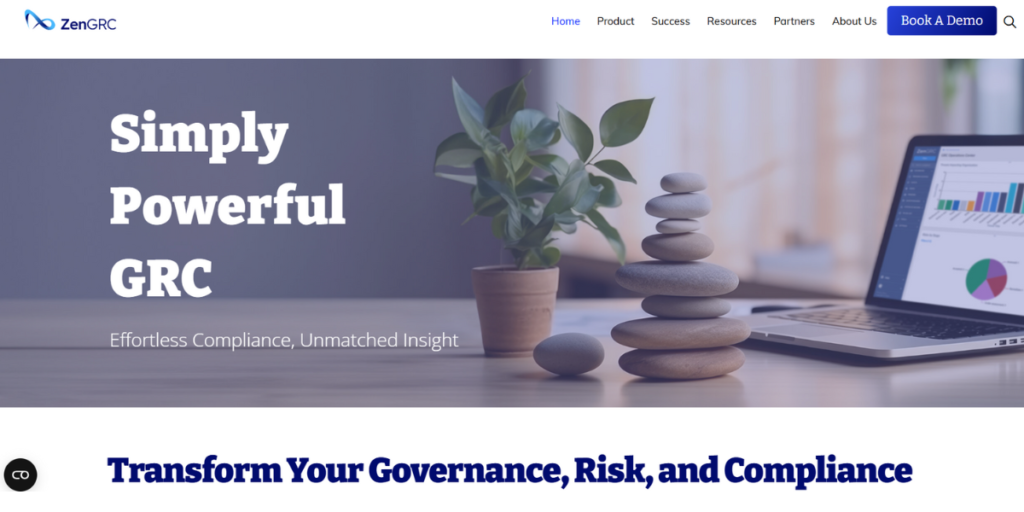
ZenGRC helps organizations control their risks while making audit procedures easier and enhancing regulatory compliance. The system collects compliance data from across the organization into one easy dashboard for better monitoring. ZenGRC helps companies across industries succeed because of its simple interface and automated tools. The system offers preset tools that speed up readiness preparation and help users create correct reports.
The platform handles small and big enterprise workloads in equal measure. By connecting with Jira and Slack, ZenGRC helps teams do compliance work without leaving what they already use. The system provides automatic data analysis that shows current compliance levels and helps control safety concerns. Because of its high costs Smaller companies would have trouble using this product. Organizations should use ZenGRC when they want a simple compliance management solution that brings all their data under one efficient system.
Key Features:
- Centralized compliance dashboard for tracking and monitoring.
- Pre-configured audit templates and task automation.
- Real-time risk and compliance reporting.
Pros:
- Easy to use, even for non-technical teams.
- Comprehensive reporting and analytics tools.
- Seamless integration with existing systems like Jira and Slack.
Cons:
- Higher price point for small businesses.
- Requires initial training for setup.
- Limited customization for industry-specific needs.
Price: Starts at $25,000/year.
Website: www.zengrc.com
2. LogicGate Risk Cloud
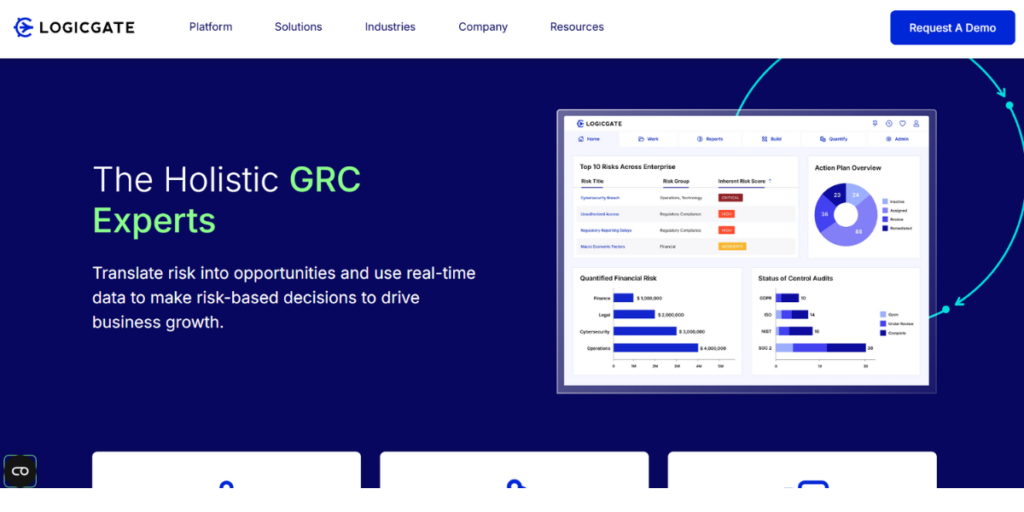
LogicGate Risk Cloud creates customizable solutions that match the needs of each business environment. This compliance management software merges the capabilities of risk management, compliance and incident handling to display risks in the total organization picture. Healthcare technology and finance clients benefit from LogicGate Risk Cloud by receiving live monitoring alerts to enhance their decision-making.
LogicGate’s custom modules help customers adjust their workflow patterns and reports based on their asset and environment specifics. The system fits better than standard options when organizations require specific compliance setups they need to modify over time. Our platform works with other best-known tools so users can share their work data smoothly. Users have trouble setting up this versatile platform, particularly at its beginning stages. Smaller companies face difficulties with price-related decisions. LogicGate Risk Cloud helps organizations build a flexible compliance system at scale.
Key Features:
- Customizable compliance workflows and templates.
- Real-time monitoring and notifications.
- Seamless integration with third-party tools.
Pros:
- Highly customizable to fit unique business needs.
- Excellent customer support and training resources.
- Scalable for growing businesses.
Cons:
- Learning curve for new users.
- Limited out-of-the-box functionality for niche industries.
- Costly for small businesses.
Price: Available upon request.
Website: www.logicgate.com
3. Qualio
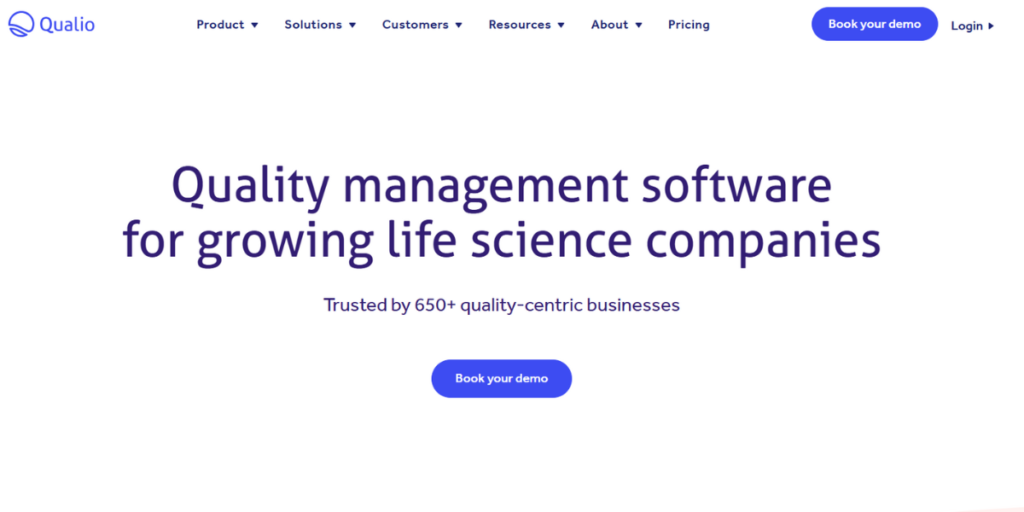
Qualio builds quality and compliance management software for healthcare settings that serve life sciences and pharmaceutical purposes. The system simplifies the way healthcare providers manage documents while meeting regulations and developing quality improvements. Qualio helps companies follow FDA and ISO requirements to reach official standards.
Users on Qualio can manage shared documents simultaneously with automatic version tracking. Workflow automation technology lets businesses do their work efficiently and dependably. Its best performance comes from serving health-regulated businesses though it shows weaker results in other industries.
Many small companies have trouble paying the product’s fees. Even though it has specific challenges Qualio’s quick setup and advanced compliance tools help companies maintain quality standards and follow industry regulations effectively.
Key Features:
- FDA and ISO compliance support.
- Document control with collaboration tools.
- Workflow automation for quality processes.
Pros:
- Specialized for healthcare and life sciences.
- Strong document version control and tracking.
- Quick implementation and onboarding.
Cons:
- Limited suitability for industries outside healthcare.
- Fewer integrations compared to competitors.
- Pricing can be steep for startups.
Price: Starts at $10,000/year.
Website: www.qualio.com
4. VComply
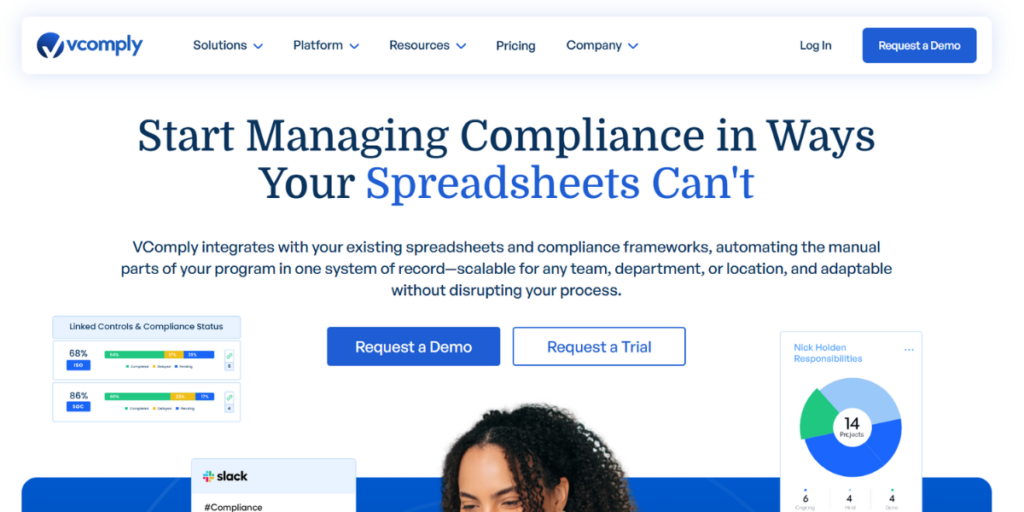
VComply offers a simple platform for organizations to centralize their policy administration and monitor both risk points and regulatory requirements. The simple platform at VComply lets teams work together smoothly while keeping strong security systems intact. Smaller and medium-sized companies find the platform ideal because they receive cost-effective plans and adaptable tools.
VComply lets users access compliance management software tools based on their roles tracks incidents and shows compliance progress through real-time dashboards. The system helps teams follow compliance requirements more easily and creates comprehensive tracking records to boost responsibility.
Its premium analytics tools don’t match those of other systems and its advanced customization features are bounded. Even though VComply faces technical limitations it remains a useful option for organizations aiming to manage compliance effortlessly at an affordable price point.
Key Features:
- Role-based access controls for secure collaboration.
- Comprehensive compliance reporting and dashboards.
- Incident management and resolution tracking.
Pros:
- Simplifies complex compliance workflows.
- Affordable pricing for small businesses.
- Detailed compliance activity logs.
Cons:
- Limited advanced analytics capabilities.
- Customization options are not as robust.
- Occasional lags in system performance.
Price: Starts at $8/user/month.
Website: www.vcomply.com
5. Hyperproof
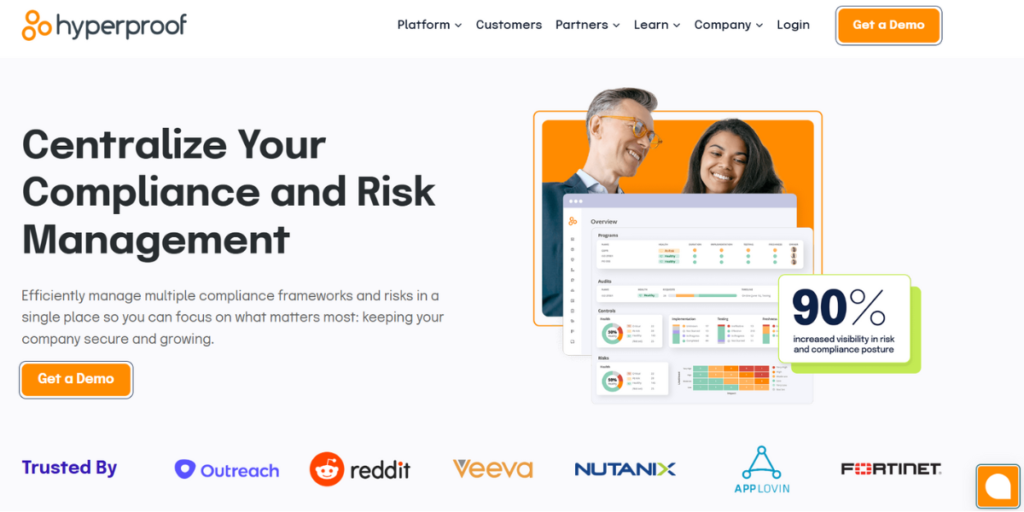
The modern compliance platform Hyperproof eliminates manual work to manage compliance better with distributed workforces. Hyperproof specializes in automatic workflow systems and continuous evidence monitoring to support organizations that handle challenging compliance procedures. Hyperproof lets teams work together through platform connections with Slack, Jira, and Microsoft Teams.
The platform’s simple setup system lets everyone onboard regardless of their technology skills. Hyperproof best fits mid-sized companies and distributed teams because it performs powerful integration work and shows every compliance step. The compliance management software tools needs enhanced reporting features compared to others on the market and spending increases when more users use it.
Key Features:
- Real-time evidence collection and tracking.
- Integration with tools like Jira, Slack, and Microsoft Teams.
- Automation of compliance workflows.
Pros:
- User-friendly and quick setup.
- Strong integration with other software.
- Ideal for remote teams managing compliance.
Cons:
- Limited advanced reporting options.
- Best suited for mid-sized companies.
- Costs can add up with multiple users.
Price: Starts at $50/user/month.
Website: www.hyperproof.io
6. Netwrix Auditor
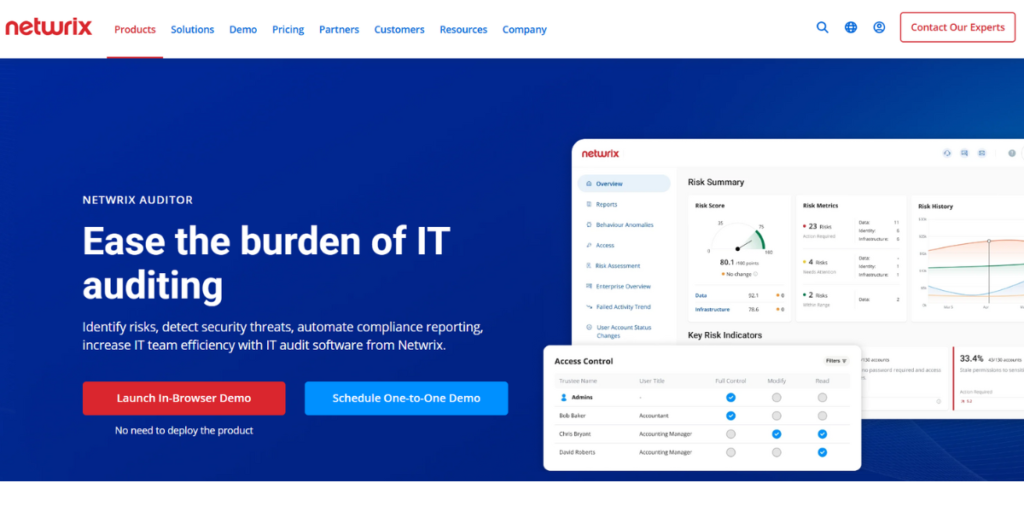
Netwrix Auditor helps companies maintain security by monitoring user access to sensitive data. You can set up different templates under industry standards such as GDPR, HIPAA, and PCI DSS to create automated audits. Data-focused IT groups in the financial and healthcare sectors widely use this tool because of its enhanced data security features.
Netwrix Auditor protects organizations with extended capabilities that can identify abnormal changes before they become security threats. The platform works well right out of the box and delivers simple controls that help small medium-sized companies benefit from it. Its outdated interface and lack of customization options will make users uncomfortable especially when they work in special industries.
Key Features:
- Predefined compliance and audit templates.
- Data access and activity monitoring.
- Risk mitigation through anomaly detection.
Pros:
- Strong focus on data security compliance.
- Easy to set up predefined reports.
- Detailed access tracking for sensitive data.
Cons:
- Not suitable for industries outside IT and data security.
- Interface can feel outdated.
- Lacks advanced customization options.
Price: Starts at $900/year.
Website: www.netwrix.com
7. ComplySci
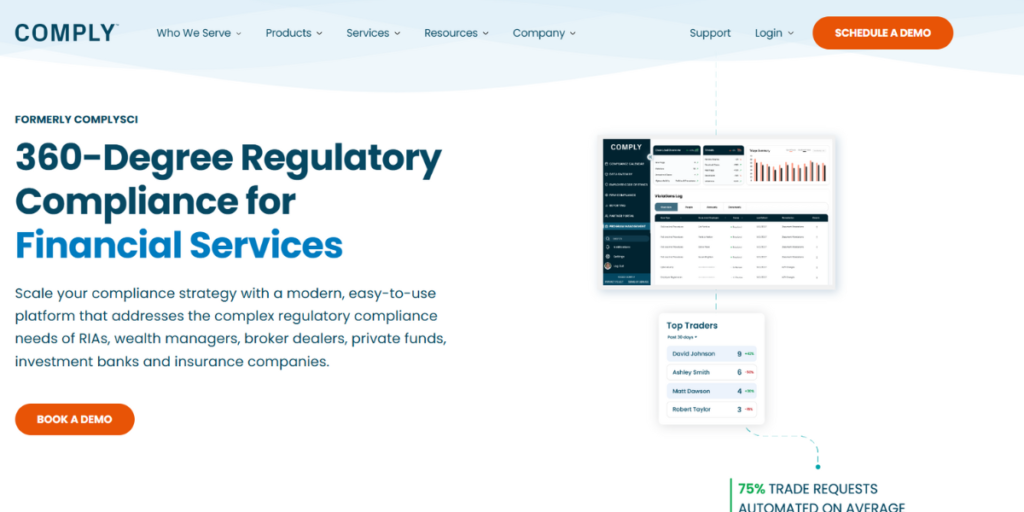
ComplySci creates compliance management tools that assist financial institutions. The system watches what employees do including their trades plus political donations and giving as it helps them follow industry rules. ComplySci uses automated systems to find and address conflicts of interest for financial businesses.
The platform demonstrates powerful results when handling intricate financial services compliance requirements. This technology suits financial business operations better than other industries. Smaller teams may have problems with their setup requirements and cost for the platform. ComplySci provides powerful monitoring capabilities and specializes in compliance tools for financial organizations which make it essential in their industry.
Key Features:
- Employee activity monitoring and tracking.
- Regulatory compliance for financial firms.
- Automated conflict-of-interest checks.
Pros:
- Tailored to financial services compliance.
- Simplifies conflict-of-interest management.
- Advanced monitoring features.
Cons:
- Limited usability for non-financial industries.
- Higher cost compared to generic tools.
- Complex setup for small teams.
Price: Available upon request.
Website: www.complysci.com
8. AdaptiveGRC

AdaptiveGRC serves as a powerful platform for the governance and compliance operations tool of large companies. Through its linked features organizations can store and operate compliance records alongside safety information and management activities in one platform.
The AdaptiveGRC platform adapts to individual compliance needs making it workable for businesses that follow unique standards. The platform adapts to growing businesses while costing more use than smaller teams can handle and is challenging to learn for basic users. Our analysis shows AdaptiveGRC’s complete tools and strong governance functions make it a fantastic solution for enterprise needs.
Key Features:
- Integrated risk and compliance management modules.
- Customizable workflows and reports.
- Real-time compliance monitoring.
Pros:
- Offers extensive customization options.
- Scalable for large enterprises.
- Strong focus on governance and risk management.
Cons:
- Expensive for small businesses.
- Steep learning curve.
- Limited industry-specific templates.
Price: Available upon request.
Website: www.adaptivegrc.com
9. Compliance360
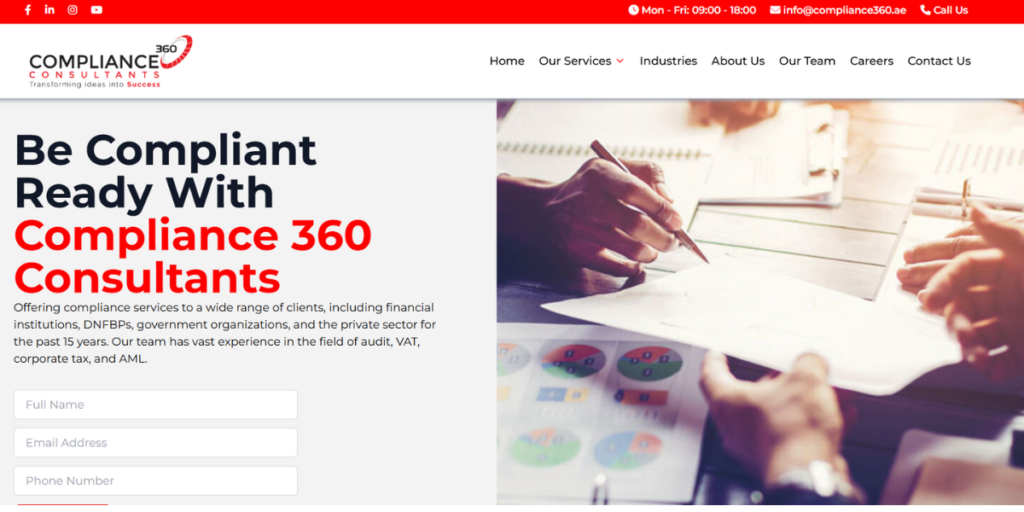
Compliance360 helps different industries including healthcare, financial services and government obtain compliance functionality. The system helps organizations create and automate policies alongside testing for security vulnerabilities to meet all their corporate compliance standards. The system provides expert solutions for particular sectors yet proves costly and hard to use for smaller firms. Despite its potential challenges, Compliance360 wins customer trust because of its strong support team and advanced system capabilities.
Key Features:
- Policy and document management tools.
- Automated audit trails and workflows.
- Risk and incident management modules.
Pros:
- Comprehensive tools for enterprise compliance.
- Excellent customer support.
- Tailored solutions for healthcare and finance.
Cons:
- Costly for small teams.
- Requires training for advanced features.
- Some features are industry-specific.
Price: Available upon request.
Website: www.compliance360.com
10. MetricStream
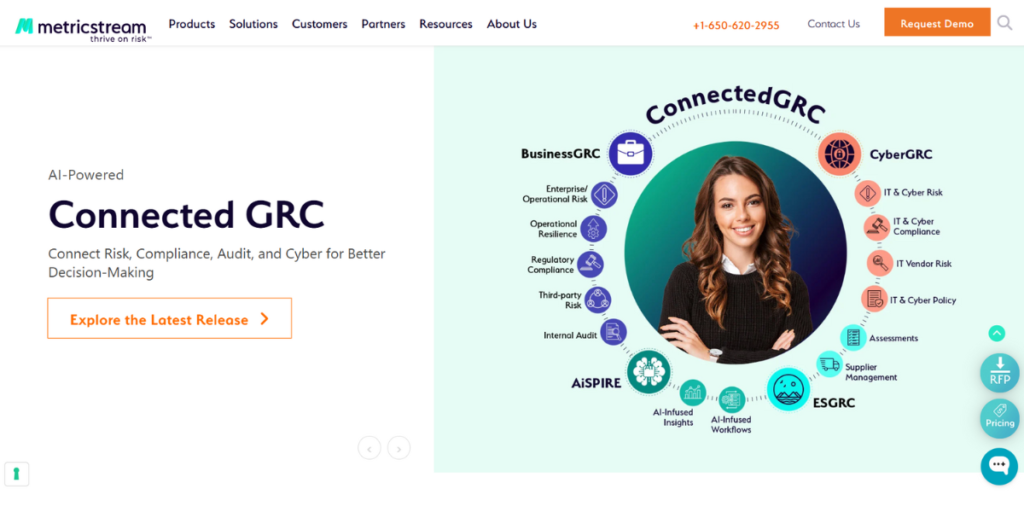
MetricStream delivers a top GRC platform that handles every stage of compliance management software tools. It offers an integrated platform to control compliance controls from all company regions at once. The platform meets different regulations from SOX to HIPAA and GDPR standards to fit various industries.
MetricStream needs customization but costs too much and installation takes long for organizations that do not need full-scale features and implementation. Large companies benefit from MetricStream’s effective automation methods and extensive analysis tools which strengthen their compliance program.
Key Features:
- Enterprise-wide compliance tracking.
- Advanced analytics and dashboards.
- Integration with ERP and CRM systems.
Pros:
- Robust enterprise-level features.
- Extensive reporting and analytics capabilities.
- Strong focus on regulatory compliance.
Cons:
- High cost for implementation.
- Limited suitability for smaller organizations.
- Requires significant onboarding and training.
Price: Available upon request.
Website: www.metricstream.com
Steps to Choose the Best Compliance Management Tool
- Understand Business Needs: Understand what compliance obligations your industry places on your business and its current difficulties.
- Evaluate Key Features: In your research focus on systems that offer automated tools alongside audit management systems and reporting tools in combination with effortless data connections.
- Assess Scalability: The tool should work well as your company grows.
- Consider User-Friendliness: A simple interface design helps users start working more quickly while needing less expert training.
- Check Integration Capabilities: Pick tools that work effortlessly with your present systems.
- Review Vendor Support: Evaluate the level of support customers get from representatives.
- Analyze Costs: Decide on a tool that serves your needs within your budget.
- Read Reviews: Read what users think about the software based on their stories.
Conclusion
Businesses need compliance management software to succeed and meet new industry standards. These products, along with Identity Management Tools, let organizations do business better by streamlining tasks and making crucial information accessible while keeping them safe from dangers so they can grow without risking their operations.
The right tools simplify tasks around audits and policies while bringing your industry-specific requirements into proper alignment. To select the right compliance management tool, businesses must examine their needs and test software features before choosing a solution that grows with their operations.
FAQs
1. What does compliance management software do?
Compliance management tools helps organizations control their legal responsibilities and overviews their safety procedures along with protecting against security risks.
2. Why do organizations need to manage compliance?
Managed compliance saves organizations from legal problems and keeps their reputation intact.
3. What businesses find success with regulatory compliance applications?
Companies in healthcare, finance, manufacturing, and IT need special software to follow regulations.
4. Can businesses adjust how their compliance management tools work?
All such systems can adjust their basic processes to match a company’s unique requirements.
5. Which compliance management software delivers the best results at my business?
Study your company requirements and compare system features to scale performance before making your decision.
